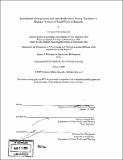| dc.contributor.advisor | Annette Kim. | en_US |
| dc.contributor.author | Vidican Sgouridis, Georgeta | en_US |
| dc.contributor.other | Massachusetts Institute of Technology. Dept. of Urban Studies and Planning. | en_US |
| dc.coverage.spatial | e-rm--- | en_US |
| dc.date.accessioned | 2008-09-03T15:35:21Z | |
| dc.date.available | 2008-09-03T15:35:21Z | |
| dc.date.copyright | 2008 | en_US |
| dc.date.issued | 2008 | en_US |
| dc.identifier.uri | http://hdl.handle.net/1721.1/42413 | |
| dc.description | Thesis (Ph. D.)--Massachusetts Institute of Technology, Dept. of Urban Studies and Planning, 2008. | en_US |
| dc.description | Includes bibliographical references (p. 299-309). | en_US |
| dc.description.abstract | My dissertation examines an unexpected outcome of post-socialist agricultural transformation in the Central and Eastern European countries. Contrary to the initial expectations of Neoliberal transition policy-makers, various forms of agricultural associations emerged throughout the former communist countries, following the distribution of private property rights to individuals. The reallocation of land in associations occurred while this institutional arrangement was criticized in the literature and individual farming was portrayed as the panacea for these countries. The main research question that frames my dissertation is: Why do farmers still persist in joining associations despite perceived collective action problems and the availability of leasing as a close substitute? Additional questions are also examined: Why did associations emerge in some regions and not in others? What are the factors that affect landowners' choices between associations and leasing transactions? How different, or similar are associations from the old socialist collective farms? While earlier literature focused on explaining why landowners choose to farm the land individually, the choice between associations and leasing has not been previously researched. Using statistical analysis on household surveys and qualitative fieldwork I explain why and under what conditions associations are the optimal farming alternatives for landowners. Going beyond the capital constraints argument, I examine the role of institutional legacies and the effect of collectivization in explaining regional differences in land reallocation during transition. | en_US |
| dc.description.abstract | (cont.) Based on my findings, theories of institutional change that view transition as a homogeneous and atemporal process across and within countries do not fully capture the interdependencies between different factors that shape individuals' responses to the incentives and constraints imposed by transition. This research provides policy recommendations especially for land consolidation efforts. Given high transaction costs associated with participating in land markets, farming associations should be strongly emphasized as a channel for achieving land consolidation. Support measures, such as improved access to credit and marketing channels, can enhance the competitiveness of associations. | en_US |
| dc.description.statementofresponsibility | by Georgeta Vidican Sgouridis. | en_US |
| dc.format.extent | 309 p. | en_US |
| dc.language.iso | eng | en_US |
| dc.publisher | Massachusetts Institute of Technology | en_US |
| dc.rights | M.I.T. theses are protected by
copyright. They may be viewed from this source for any purpose, but
reproduction or distribution in any format is prohibited without written
permission. See provided URL for inquiries about permission. | en_US |
| dc.rights.uri | http://dspace.mit.edu/handle/1721.1/7582 | en_US |
| dc.subject | Urban Studies and Planning. | en_US |
| dc.title | Institutional arrangements and land reallocation during transition : a regional analysis of small farms in Romania | en_US |
| dc.type | Thesis | en_US |
| dc.description.degree | Ph.D. | en_US |
| dc.contributor.department | Massachusetts Institute of Technology. Department of Urban Studies and Planning | |
| dc.identifier.oclc | 237219983 | en_US |
